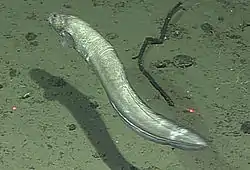PERISCOP
The PERISCOP is a pressurized recovery device designed for retrieving deep-sea marine life at depths exceeding 2,000 metres.[1]: 881 The device was designed by Bruce Shillito and Gerard Hamel at the Universite Pierre et Marie Curie.[2] The name is an acronym for the French phrase Projet d’Enceinte de Remontée Isobare Servant la Capture d’Organismes Profonds ("Enclosure project for isobaric ascent serving to capture deep organisms").[1]
History

The PERISCOP is a unique pressurized recovery devices that contains three chambers – one for capture, one for recovery under exterior pressure, and one for transfer to the laboratory while maintaining pressure. Previous recovery devices used one chamber for all purposes.[1]: 882 An arm designed to capture samples by force of suction is attached to the device.[2] During ascent, pressure is maintained within the chamber by use of pressurized water.[1]: 883 Upon surfacing, samples can be observed, filmed, and/or photographed through transparent view ports in the device.[1]: 884 Due to fluctuations in atmospheric pressure and temperature recorded pressures during ascent and at the surface may ranged from 74%-111% of the natural pressure at sea depth.[1]: 884 The device set a record for the deepest live-fish capture under pressure when it captured a Pachycara at 2,300 m.[1]: 887 The previous record was 1,400 m.[2] The capture was the first to be performed at a hydrothermal vent.[1]: 886 [2] The device has also recovered several shrimp species (Mirocaris fortunata, Chorocaris chacei, and Rimicaris exoculata) at vent fields Lucky Strike and Rainbow.[2]
References
- Shillito, B; Hamel; Duchi; Cottin; Sarrazin; Sarradin; Ravaux; Gaill (1 July 2008). "Live capture of megafauna from 2300m depth, using a newly designed Pressurized Recovery Device" (PDF). Deep-Sea Research Part I: Oceanographic Research Papers. 55 (7): 881–889. Bibcode:2008DSRI...55..881S. doi:10.1016/j.dsr.2008.03.010. Retrieved 18 February 2011.
- Lever, Anna-Marie (31 July 2008). "Live fish caught at record depth". BBC News. Retrieved 18 February 2011.